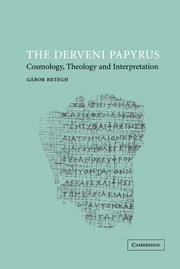Book contents
- Frontmatter
- Contents
- Preface
- List of abbreviations
- Text and translation
- 1 The find
- 2 The first columns
- 3 The reconstruction of the poem
- 4 The interpretation of the poem
- 5 The cosmic god
- 6 Cosmology
- 7 Anaxagoras
- 8 Diogenes of Apollonia and Archelaus of Athens
- 9 Physics and eschatology: Heraclitus and the gold plates
- 10 Understanding Orpheus, understanding the world
- Appendix: Diagoras and the Derveni author
- Bibliography
- Index verborum
- Index of passages
- Index of modern names
- Index of subjects
Appendix: Diagoras and the Derveni author
Published online by Cambridge University Press: 23 December 2009
- Frontmatter
- Contents
- Preface
- List of abbreviations
- Text and translation
- 1 The find
- 2 The first columns
- 3 The reconstruction of the poem
- 4 The interpretation of the poem
- 5 The cosmic god
- 6 Cosmology
- 7 Anaxagoras
- 8 Diogenes of Apollonia and Archelaus of Athens
- 9 Physics and eschatology: Heraclitus and the gold plates
- 10 Understanding Orpheus, understanding the world
- Appendix: Diagoras and the Derveni author
- Bibliography
- Index verborum
- Index of passages
- Index of modern names
- Index of subjects
Summary
Richard Janko has recently suggested that the Derveni papyrus is the work of Diagoras of Melos, probably his book called Apopyrgizontes logoi. Janko first developed this hypothesis in a longer paper about the authorship of the papyrus, and then further argued it in the discussion accompanying his new translation of the papyrus. While I consider Janko's translation and textual suggestions an important advance, I find his hypothesis about the identity of the author unconvincing. I propose to check the suggestion about Diagoras' authorship in three steps. First, I shall compare Diagoras' general attitude towards religious matters to the image we have found in the papyrus. In a second step, I shall turn to the question of whether we can ascribe the more specific doctrines found in the papyrus to Diagoras. Finally, I shall examine the proposed identification of the text of the papyrus with the Apopyrgizontes logoi. I shall mainly rely on Marek Winiarczyk's collection of ancient evidence on Diagoras, accompanied by a circumspect discussion of this author, and the two other most important modern studies of Diagoras, one by Felix Jakoby and the other by Leonard Woodbury.
Diagoras, a minor lyric poet, gained fame in antiquity as an ‘atheist’. Indeed, he became a stock item on ancient lists of those who denied belief in traditional gods. The nature of his ‘atheism’ is debated, however. Two distinct views have been propounded by scholars. According to some, most notably Felix Jakoby, Diagoras was an outright atheist who uncompromisingly denied the existence of gods.
- Type
- Chapter
- Information
- The Derveni PapyrusCosmology, Theology and Interpretation, pp. 373 - 380Publisher: Cambridge University PressPrint publication year: 2004



